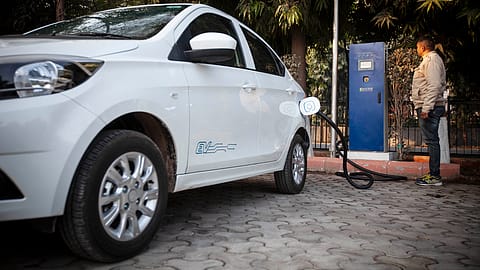Budget 2025: Auto industry shares tips to accelerate EV adoption
Continued push for EV adoption by incentives, infrastructure development and R&D initiatives will be crucial in India’s transition to green mobility, says Mercedes-Benz India's Santosh Iyer.

As the automobile industry undergoes a once-in-a-century transition to electric vehicles, Budget 2025 is expected to play a key role in driving faster adoption of EVs.
The government’s continued push for BEV adoption by pursuing the existing incentives, infrastructure development and R&D initiatives will be crucial in accelerating India’s transition to green mobility, positioning us as a key player in the global BEV value chain, says Santosh Iyer, managing director and CEO, Mercedes-Benz India.
Iyer suggests reducing trade barriers and simplifying regulatory frameworks that can further integrate India into global supply chain. “Any additional measures that lower the cost of doing business, can result in attracting new investments and boost advent of new technologies and innovation. By prioritizing these areas, the government can create a resilient, future-ready economy, bolstering India’s firm standing on the global stage,” says Iyer.
Following two strong years of growth, FY25 has been a period of consolidation for the domestic automotive industry with demand sentiments for most of the segments remaining steady and the pace of electrification continuing to rise, says Shamsher Dewan, senior vice president and group head, Corporate Ratings, ICRA.
ICRA expects the Union Budget 2025-26 to focus on measures fostering growth, innovation and sustainability. “Thrust on infrastructure spending, rural output and job creation shall continue to be key focus areas. This apart, proposals around skill development, rationalisation of tax rates and policy measures promoting the ecosystem of alternative fuels, vehicle scrappage, and parts localisation shall aid the broader automotive sector,” says Dewan.
The upcoming Union Budget presents an opportunity to address some pressing needs of the automotive sector, says Piyush Arora, MD and CEO of Skoda Auto Volkswagen India. “There are early signs of auto industry growth slowing down. Therefore, budgetary initiatives to boost disposable income of consumers is necessary to support robust growth,” says Arora. “A long-term vision for favorable tax structure catering to different automotive technologies would certainly benefit the industry. The product development cycles are quite lengthy and require substantial investment which needs to be considered. Simplifying the GST structure for the different classes of vehicles & components is another ask,” he says.
Budget allocation on facilitating the EV ecosystem like charging infrastructure will give further lift to sustainable mobility, Arora says, adding that allocating a budget for better and safe road infrastructure will facilitate the growth of the auto industry.
Recommended Stories
In the upcoming budget, we hope for sustained focus on infrastructure spending and enhancing the scope of PLIs. With regards to the automotive sector, India is now on the verge of achieving the target of Vikram Gulati, country head and executive vice president - Corporate Affairs and Governance, Toyota Kirloskar Motor, requests the government for appropriate merit-based policies that support and help in popularising full range of greener technologies and alternative fuels thereby helping in faster and greater adoption of multiple sustainable mobility solutions. “Measures to encourage the scrappage of old vehicles through the budget will also boost demand for newer generation vehicles and eliminate the polluting ones,” he says.
Kshiteej Mishra, practice leader, Mobility, Energy and Transportation at Praxis Global Alliance, says the EV industry advocates for GST parity on batteries, currently taxed at 18%, compared to 5% for EVs. A uniform rate would streamline costs across the value chain and reduce the overall cost of EVs by 5%-10%, says Mishra.
The Indian EV industry’s key demands include a uniform 5% GST across EVs, batteries, and charging services, subsidies to boost domestic battery manufacturing, centralised consumer incentives, and increased funding for charging infrastructure, says Chandrasekar Krishnamurthy, Global Engineering director, Systems, Software and Engineering Excellence, BorgWarner.
“Continued support for initiatives like the Production Linked Incentive (PLI) and FAME schemes is essential to reduce costs, strengthen local supply chains, and decrease reliance on imports. The union budget’s focus on these areas will be crucial to creating a favourable environment for the EV sector’s growth in India,” says Krishnamurthy.
(INR CR)